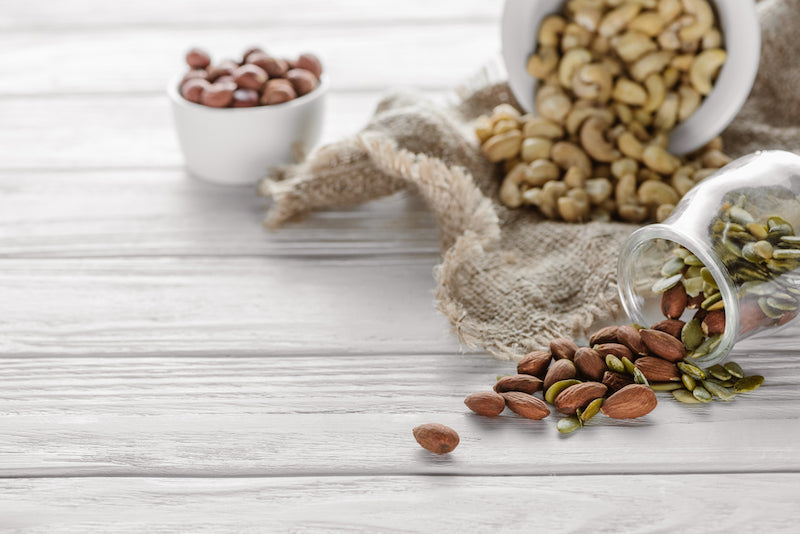When it comes to nutrition, almonds pack a powerful punch.
Rich in vitamins, minerals, antioxidants, and healthy fats, these popular tree nuts deliver a hearty dose of nutrients in one small serving, but do they have protein?
Let’s find out.
Are Almonds a Good Source of Protein?
Like all nuts, almonds contain some protein which is part of what makes them such a well-rounded food. 1-ounce (about ¼ of a cup) of almonds contains roughly 6 grams of protein compared to peanuts which contain about 7 grams.
Almonds and peanuts are among the highest protein nuts however, almonds are actually considered a seed [1].
How is Almond Protein Made?
Since almonds contain a hearty dose of protein, it’s no surprise that food and supplement companies have decided to capitalize on this benefit by creatine products such as almond flour, almond butter, and almond protein as healthier alternatives to other foods.
Almond powder can be made by taking almonds that have been processed to have the skins removed, extracting the oil from them and then grinding them into a fine powder, a similar process to making peanut protein.
Almond protein can be used as a base for protein shakes, blended into a smoothie, added to baked goods, and more, just like any regular protein powder.
Almond protein is a great plant-based, grain-free, gluten-free, soy-free, and dairy-free, alternative protein powder for those who suffer from food allergies or intolerances.
Does Almond Milk Have Protein?
While almonds are a rich source of protein, almond milk doesn’t have as much protein as cow’s milk or soy milk. In fact, 1-cup of almond milk has about 1 gram of protein on average.
This is likely because the amount of almonds you will be getting from 1 serving of almond milk is a lot lower than if you were to just eat a handful of almonds.
Almond milk can be made by soaking almonds and then blending them in a high-speed blending with a little bit of water and salt.

Almond Butter vs Almond Protein: What's the Difference?
When looking at almond products, another popular option is almond butter. But how does this differ from almond protein?
Almond butter, like peanut butter, is almonds that have been blended in a high-speed blender until the oils are released and the product becomes a buttery texture that is easy to spread on foods. Almond butter uses the oils in the almonds to create the creamy consistency of its product while almond protein has the oils removed to create a concentrated powder that can be easily mixed into foods.
Both almond butter and almond protein contain about the same amount of protein per serving however, almond butter contains a richer source of fat and calories compared to almond protein due to the oils.
Additionally, almond butter actually contains a higher dose of antioxidants per serving as almond butter is typically made by blending almonds that still contain the skin.
The brown skin covering the almonds, which is typically removed when making almond protein, contains the highest amount of antioxidants [2].
Is Almond Protein Good For Muscle Growth and Recovery?

When it comes to protein powders for muscle building, whey protein tends to be the number one contender. However, when it comes to plant-based options, almond protein should not be ruled out.
In fact, studies have found that almond protein may be just as effective as whey protein powder in muscle building however, studies are limited and more research is still needed to determine the true benefits of almond protein [3].
Does it Have BCAAs?
Branched-chain amino acids (BCAAs) are the 3 essential amino acids leucine, isoleucine, and valine, that have been associated with additional benefits for increasing muscle mass and improving post-exercise recovery [4, 5].
BCAAs can be found in most protein-rich foods, including almonds. While BCAAs will be most concentrated in higher protein foods such as meat, fish, poultry, eggs, and dairy products, the amount found in almonds is complementary to most diets and can be essential for those choosing plant-based.
Could I Be Allergic to Almond Protein Powder?

If you have an allergy to almonds, it is recommended to avoid almond products, including almond protein.
The compound that results in an allergic reaction in these individuals (Amandin) is not removed during the processing of almond protein. Use caution if an allergy to other tree nuts is present and always read food labels for allergy information [6].
What are the Possible Side Effects Risks?
Because almond protein is made only from almonds, the side effects and risks of consuming almond protein powder is minimal and limited mainly to potential allergic reactions in some. It may also cause an upset stomach if consumed in excess.
TL;DR
Almonds are nutritionally dense and a great source of protein which is why many supplement companies decided to create almond protein powders. This is made by removing the oil from the almonds and grinding them into a fine powder that can easily be added to foods and liquids.
Almond protein contains a great source of plant-based protein that includes BCAAs and is associated with improvements in muscle growth and recovery similarly to a whey protein powder. Unless an allergy is present, there is minimal risk or side effects to consuming almond protein as it is only made from almonds.






